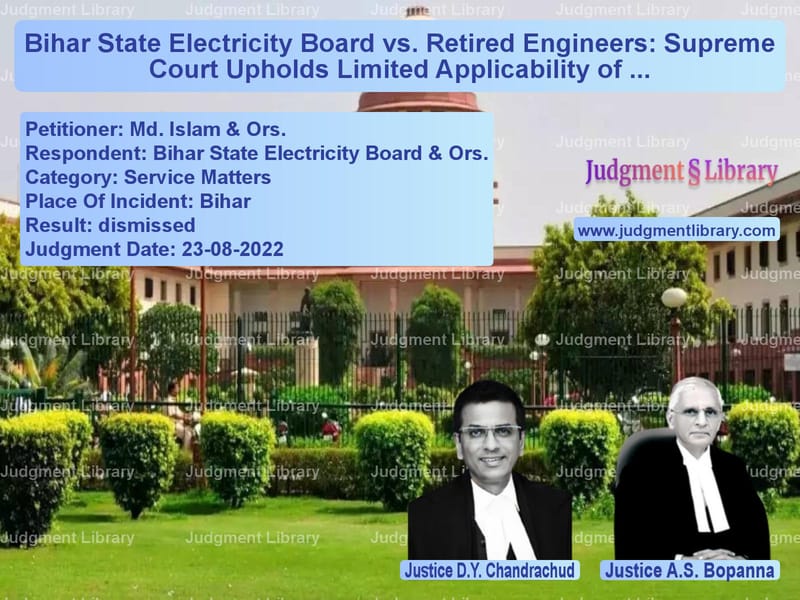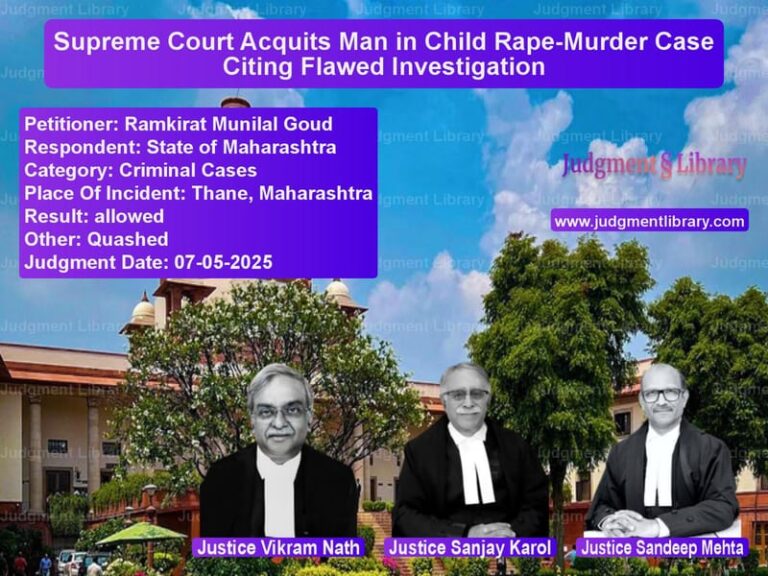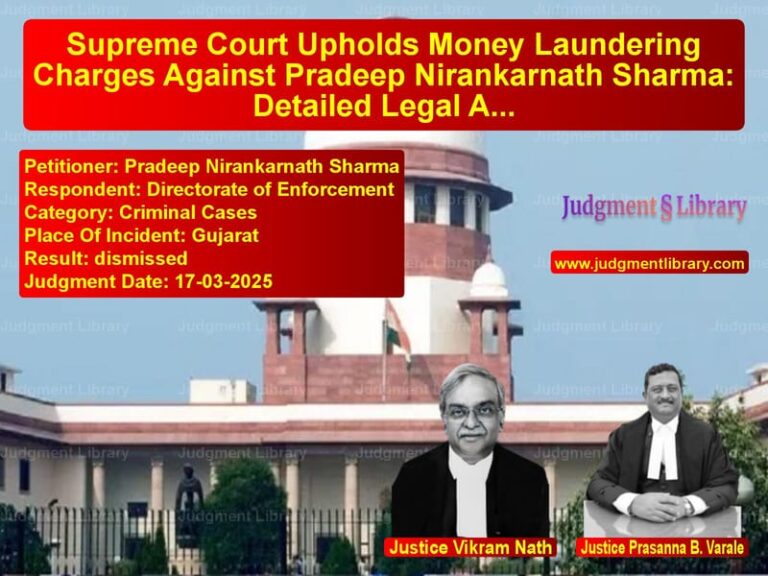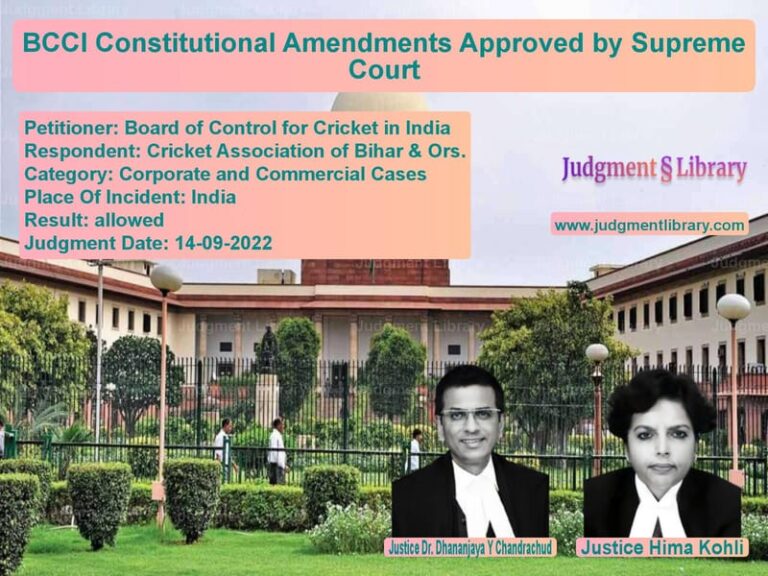Bihar State Electricity Board vs. Retired Engineers: Supreme Court Upholds Limited Applicability of ACP Scheme
The case between retired engineers of the Bihar State Electricity Board (BSEB) and the Board itself revolves around the implementation of the Assured Career Progression (ACP) Scheme. The appellants, who retired between 2000 and 2005, sought the benefits of the ACP Scheme from its original effective date in 1999. However, the Board had implemented it only for employees appointed after April 5, 2005. After their claim was dismissed by both a Single Judge Bench and a Division Bench of the Patna High Court, the appellants approached the Supreme Court, which ultimately ruled in favor of the Bihar State Electricity Board.
Background of the Case
The dispute originates from a notification issued by the Government of Bihar on June 25, 2003, introducing the ACP Scheme for state government employees. The scheme was meant to benefit employees who had been stagnating in the same pay scale by providing them financial progression. However, it specifically excluded employees of public undertakings or autonomous institutions.
The Bihar State Electricity Board adopted the ACP Scheme through a notification dated April 5, 2005, but made it applicable only to employees appointed after this date. A subsequent notification on October 7, 2005, clarified this applicability. The retired engineers contended that they should be entitled to the benefits from August 9, 1999, as granted to Bihar state government employees.
Read also: https://judgmentlibrary.com/supreme-court-sets-aside-high-court-judgment-in-sbi-disciplinary-case/
Petitioners’ Arguments
The retired engineers, represented by their legal counsel, argued the following points:
- The ACP Scheme was introduced with a retrospective effect from August 9, 1999, for state government employees, and the same benefit should be extended to them.
- The selection grade and time-bound promotion benefits previously granted to them should not preclude them from receiving ACP benefits.
- A government notification issued in March 2006 stated that financial progressions under earlier schemes would not be counted as dual benefits under the ACP Scheme.
- Reliance was placed on the Supreme Court’s decision in Union of India v. S. Dharmalingam (1994) 1 SCC 179, which held that an earlier financial benefit does not bar an employee from receiving benefits under a subsequent scheme.
Respondents’ Arguments
The Bihar State Electricity Board defended its decision on the following grounds:
- The Board had the discretion to decide whether to adopt the ACP Scheme and, if so, from which date.
- Under the Electricity (Supply) Act, 1948, the Board had framed its own service regulations, meaning state government notifications did not automatically apply to it.
- The June 25, 2003, government notification explicitly stated that the ACP Scheme would not apply to public sector undertakings and autonomous bodies.
- By the time the Board adopted the ACP Scheme in 2005, most appellants had already retired, making them ineligible.
- The appellants had already benefited from prior promotional schemes and did not challenge the notification until 2011.
Supreme Court’s Key Observations
The Supreme Court, after hearing both sides, made several key observations:
- The ACP Scheme was not automatically applicable to the Bihar State Electricity Board, as it was an autonomous body.
- The government’s notification from 2003 explicitly excluded public sector and autonomous bodies from its purview.
- The Board had the discretion to adopt the scheme and decide its effective date.
- The Board implemented the ACP Scheme on April 5, 2005, and further clarified in a notification on October 7, 2005, that it would apply only to new appointees.
- The Supreme Court rejected the argument that the selection grade and time-bound promotion benefits should not affect ACP eligibility, stating that this argument was secondary to the primary issue of the scheme’s applicability.
- The petitioners had retired before the ACP Scheme was adopted by the Board and could not claim benefits retrospectively.
Supreme Court’s Judgment
The Supreme Court upheld the decisions of the Patna High Court’s Single Judge and Division Bench, ruling that the retired engineers were not entitled to ACP benefits. The key reasons were:
- The Bihar State Electricity Board was not obligated to adopt the ACP Scheme retrospectively.
- The Board’s decision to apply the scheme only from April 5, 2005, was within its discretion.
- Employees who had already retired by this date could not claim benefits under a scheme that had not been in effect at the time of their service.
- Judicial review could only apply if the Board’s decision was arbitrary or mala fide, which was not demonstrated in this case.
Impact of the Judgment
This ruling reinforces the principle that autonomous institutions and public undertakings have the right to frame their own service regulations. While state government policies can serve as guidelines, they are not automatically binding on such bodies. The judgment also highlights that retrospective application of financial benefits is not a matter of right but depends on the discretion of the governing authority.
For public sector employees, this case serves as a precedent in understanding that schemes like ACP or other career progression benefits depend on specific adoption policies of their respective organizations. This ruling will likely be referenced in future disputes involving similar claims of retrospective applicability of government schemes in autonomous institutions.
Petitioner Name: Md. Islam & Ors..Respondent Name: Bihar State Electricity Board & Ors..Judgment By: Justice D.Y. Chandrachud, Justice A.S. Bopanna.Place Of Incident: Bihar.Judgment Date: 23-08-2022.
Don’t miss out on the full details! Download the complete judgment in PDF format below and gain valuable insights instantly!
Download Judgment: md.-islam-&-ors.-vs-bihar-state-electric-supreme-court-of-india-judgment-dated-23-08-2022.pdf
Directly Download Judgment: Directly download this Judgment
See all petitions in Pension and Gratuity
See all petitions in Employment Disputes
See all petitions in Judgment by Dhananjaya Y Chandrachud
See all petitions in Judgment by A. S. Bopanna
See all petitions in dismissed
See all petitions in supreme court of India judgments August 2022
See all petitions in 2022 judgments
See all posts in Service Matters Category
See all allowed petitions in Service Matters Category
See all Dismissed petitions in Service Matters Category
See all partially allowed petitions in Service Matters Category







